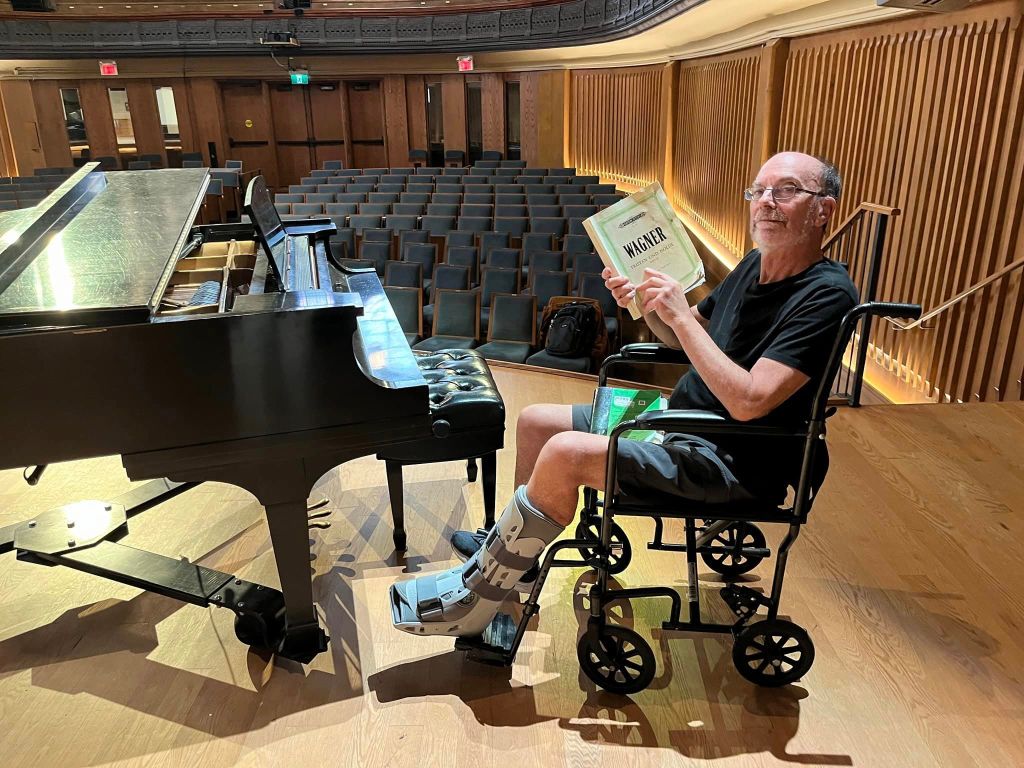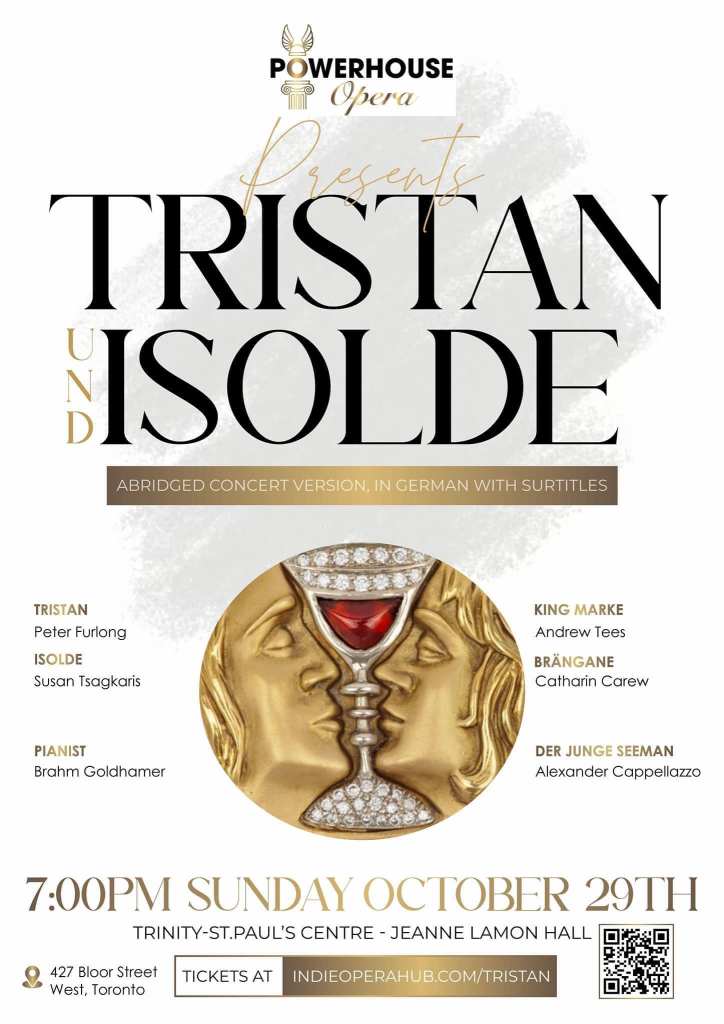Last night Powerhouse Opera presented an abridged version of Wagner’s Tristan und Isolde at Jeanne Lamon Hall.
Powerhouse Opera is a new company begun by soprano Susan Tsagkaris in March 2022, aiming to showcase dramatic / large sized voices with a focus on the works of Richard Strauss and Richard Wagner, two composers especially known for this kind of vocal writing.
We heard pianist Brahm Goldhamer, playing in spite of an injury to his leg.
Susan said the following during rehearsals, with the following photo:
“Nothing can stop a Wagner lover from getting to rehearsal, not even a messed up Achilles tendon! We’re thrilled to have Brahm as our pianist and also thrilled it was his left leg not his right!:-)“

Achilles tendon? Although he came and went in a wheelchair, a cast on one foot that prevented it from using pedal it was brave work from Brahm, whose playing made the bolder choice, often playing the fearless octave passages with big dynamics to match the voices.
It was a concert performance, gestures and expressions but no real dramatic action enacted. We saw and heard tenor Peter Furlong as Tristan, Susan as Isolde, Catherin Carew as Brangäne, Andrew Tees as King Marke, and Alexander Cappellazzo as the young sailor. The sailors’ chorus we hear a few times in Act I was also accomplished from offstage, perhaps Alexander and Andrew? I don’t know as it wasn’t mentioned in the program.
It was fascinating to watch this shorter version of the music drama widely understood as the beginning of modernism even though it premiered way back in 1865, a story associated with love and the pessimistic philosophy of Schopenhauer. Instead of a running time of four hours plus (with a little less than four hours of music but normally pushed past the four hour mark by a pair of intermissions), this version shared by the Tasmanian Symphony Orchestra came in around two hours (we were done around 9:30, having begun at 7 with a 20 minutes intermission).
That’s a mixed blessing. For those who find Wagner’s operas too long this looks like an improvement. But I had two big concerns, one dramatic, one vocal.
My drama concern? As a nerdy purist you may roll your eyes at my concerns with the story-telling. I merely want to mention that the theatrical side is sacrificed to the need for speed, a main character (Kurwenal) cut out who is important in the advancement of the story. There were moments that were a bit perplexing, and it’s not the fault of any of the performers, given the radical alteration in the story. I would far prefer that the cuts be made and –given the use of projected titles—the use of a screen to tell us what’s missing. When King Marke comes in and says his heart-broken “Tod alles tod” it makes a lot less sense if the battle scene (where Kurwenal dies, and perhaps has also killed some while defending Tristan) is removed, and there’s merely one person slumped in his chair, dead. We don’t see the fight at the end of Act II either –when Melot wounds Tristan so badly he’s almost dead— and therefore Tristan’s action when he mimes pulling off his bandages is a bit confusing. It’s tough enough for any Tristan to play this at it is, singing some of the most difficult dramatic tenor music there is, then dying before us. There’s more I could say but I already sound like a whiner, right? The piece as written is full of details that support the action, so in cutting you are making compromises. And it’s really a concert performance, not dramatized.
The vocal concern is likely unexpected, perhaps for the singers in the show. Let’s begin by stating something really important, that the roles of Tristan and Isolde include some of the most difficult singing ever written for dramatic tenor & soprano. I‘m going to make a couple of analogies to illustrate. When you walk or run, your energy expenditures are different. The roles are already like marathon runs. Ludwig Schnorr the first Tristan supposedly died after singing the part (a stroke or heart attack), although maybe he was unwell anyway. These are fiendishly difficult roles under the best of circumstances. Isolde gets several opportunities to rest and recover when others –such as Kurwenal and Tristan in Act I—are singing; when you remove that music Isolde goes from being a bit of a marathon to being more of a sprint. In this version Isolde gets fewer breaks. Act III is a big long series of scenes between Kurwenal and Tristan that are all cut, leaving just the little bit when Tristan pulls off his bandages in expectation of Isoldes arrival. Instead of that 60 minute break that would normally include all of King Marke’s confrontation of the lovers plus the intermission between Acts II and III that we didn’t have last night (sorry just speaking off the top of my head, it might actually be a longer break than that), Isolde has a shorter break, with some of Marke’s music and the tiny scene of Tristan’s death. I think this version is very difficult for any Isolde, tougher than what Wagner wrote. As for the tenor his role has been reduced substantially. The missing music at the beginning of Act III is some of my favorite music in the opera. Oh well.
So with that caveat, I did enjoy the performance, a fascinating opportunity to look closely at one of my favorite operas.
Susan’s Isolde was especially good at the ending, a Liebestod to bring the audience to their feet. Peter Furlong’s Tristan was a wonderfully dark sound, the true heldentenor blend of baritone and tenor that reaches up to all the necessary high notes with a very macho timbre. I hope to hear him again, but wish he could be given the chance to dramatize in costume, as he also seems to have acting ability to go with the voice. Catherin Carew as Brangäne had some of the most beautiful moments of the night, and Andrew Tees was a vocal and dramatic standout for a subtly underplayed portrayal of King Marke.
I will be eagerly watching to see what Powerhouse Opera offers next.

